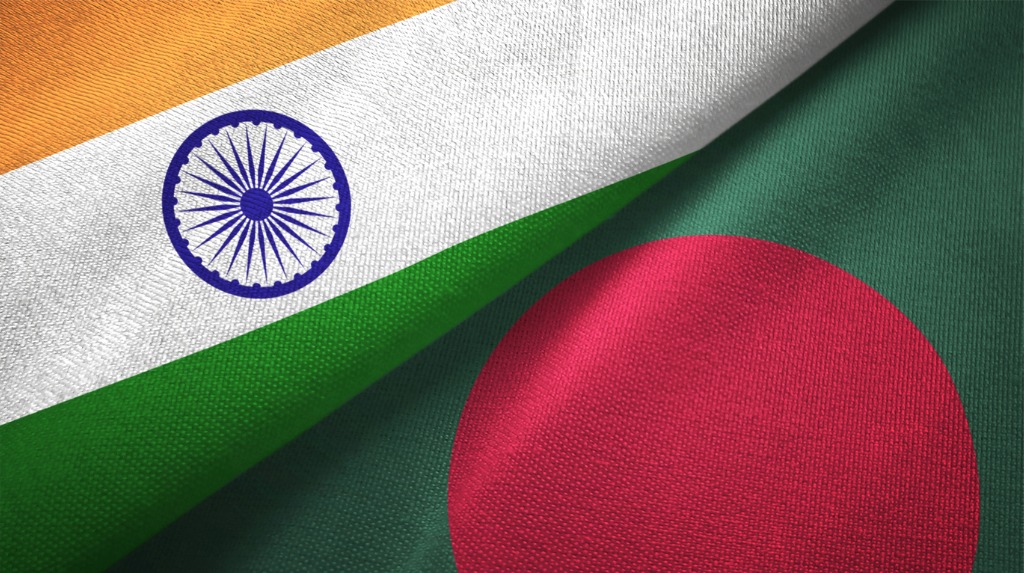INDIA-BANGLADESH RELATION
( Ayesha Salim): - In the fight against terrorism, India and Bangladesh are strong strategic allies. Additionally, they are South Asia's biggest trading partners.
Bangladesh shares four of its land borders with India, including one that runs alongside the Bay of Bengal. The longest land border that India has with any of its neighbors is the 4096.7 kilometers that Bangladesh and India share.
In a political way, as a friendly South Asian neighbor, India was the first nation to recognize Bangladesh as a distinct and independent state. India also quickly established diplomatic ties with Bangladesh upon its declaration of independence in December 1971. On a global scale, both countries participate in the SAARC, BIMSTEC, Indian Ocean Coastal Regional Cooperation Association, and Commonwealth organizations.
In India's Neighbors First strategy, Bangladesh plays a significant role. Civilizational, cultural, social, and economic ties exist between India and Bangladesh. There are many things that tie the two nations together, including a shared history and tradition, language similarities, shared cultural values, and a love of music, books, and the arts. Rabindranath Tagore also composed the national anthems of Bangladesh and India.
Bangladesh's Ties with India?
The text of the Memorandum of Understanding (MoU) on temporary water sharing of the Kushiyara river has recently been finalized by India and Bangladesh. It was done in the 38th meeting of the ministerial-level Joint Rivers Commission (JRC) of India and Bangladesh. In this, even many points were discussed such as common water sharing of rivers, protection of river banks, elimination of river pollution, and many more.
Rivers that both countries share:
54 rivers are shared by Bangladesh and India. Seven of them have already been mentioned in relation to creating the foundation for water-sharing agreements. The neighbors have decided to add eight more rivers to the data sharing. The Ganga Waters Treaty was formed in 1996 to allow for the sharing of river Ganga waters during the lean season (January 1-May 31).
Trade and Investment:
The largest trading partner of India in South Asia is Bangladesh. India exported $14.09 billion to Bangladesh in 2021. India is Bangladesh's largest trading partner due to its proximity on a geographical scale. Among India's trading partners, Bangladesh ranks sixth.
Since 2011, Bangladesh has been granted duty-free access by India under the South Asian Free Trade Area (SAFTA) on all tariff lines with the exception of cigarettes and alcohol.
Additionally, the governments of India and Bangladesh have given their approval for 6 Border Haats (4 in Meghalaya and 2 in Tripura).
Cooperation in the Power and Energy Sector
One of the defining characteristics of relations between India and Bangladesh is cooperation in the power sector.
Currently, 1160 MW of power is imported by Bangladesh from India.
The India-Bangladesh Friendship Pipeline Project, which was signed in 2018, will link Parbatipur in Bangladesh's Dinajpur district with Siliguri in India's West Bengal. The Framework of Understanding (FOU) on Cooperation in the Hydrocarbon Sector has also been signed by Bangladesh and India.
Due to all this, Bangladesh is India's largest development partner. Also, in the last eight years, India has given Bangladesh three lines of credit (LOC) totaling $8 billion for the construction of roads, trains, shipping lanes, and ports.
Current Significant Issues between Bangladesh and India
The Teesta River Water Conflict:
The Teesta River travels through Bangladesh on its way from India to the Bay of Bengal. This river is important to almost six districts in West Bengal. It is also a significant source of irrigation for Bangladesh's broader Rangpur region, where paddy is grown. Bangladesh claims that its fair share of the water is not being given to them. Since India treats water as a state matter, the Bengal state government's lack of agreement with the federal government is the bottleneck.
The two countries' disagreement over sharing the Teesta River's water supply has not yet been resolved by the signing of a treaty.
Unlawful Immigration:
Refugees and economic migrants continue to cross the border illegally from Bangladesh to India. There has been a significant migration of these migrants across the border, which has had a negative impact on Bangladesh's resources and national security as well as substantial socio-economic-political challenges for the residents of the Indian states bordering Bangladesh.

